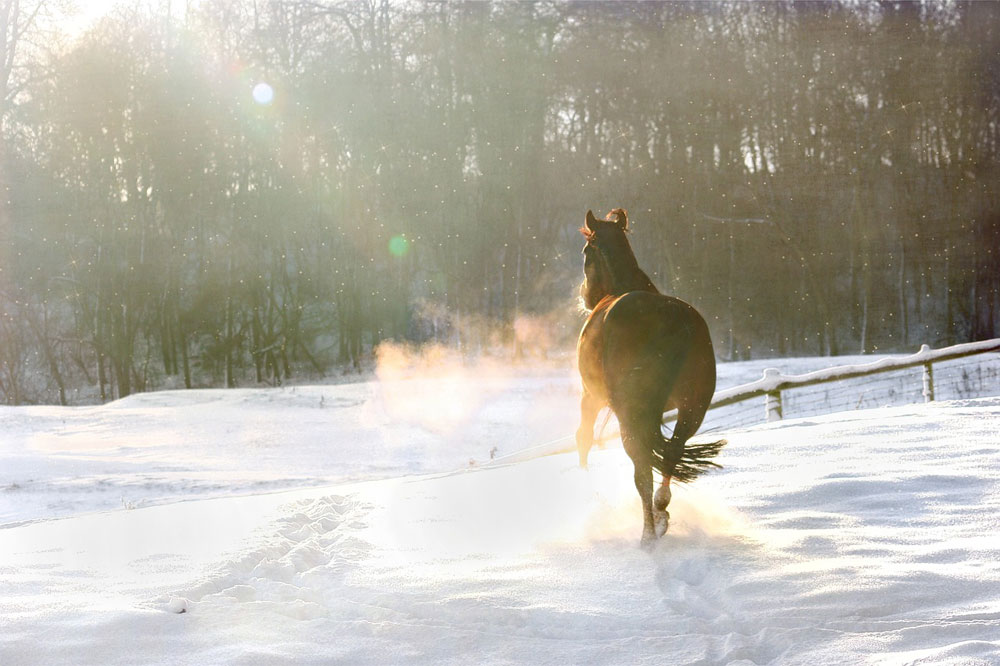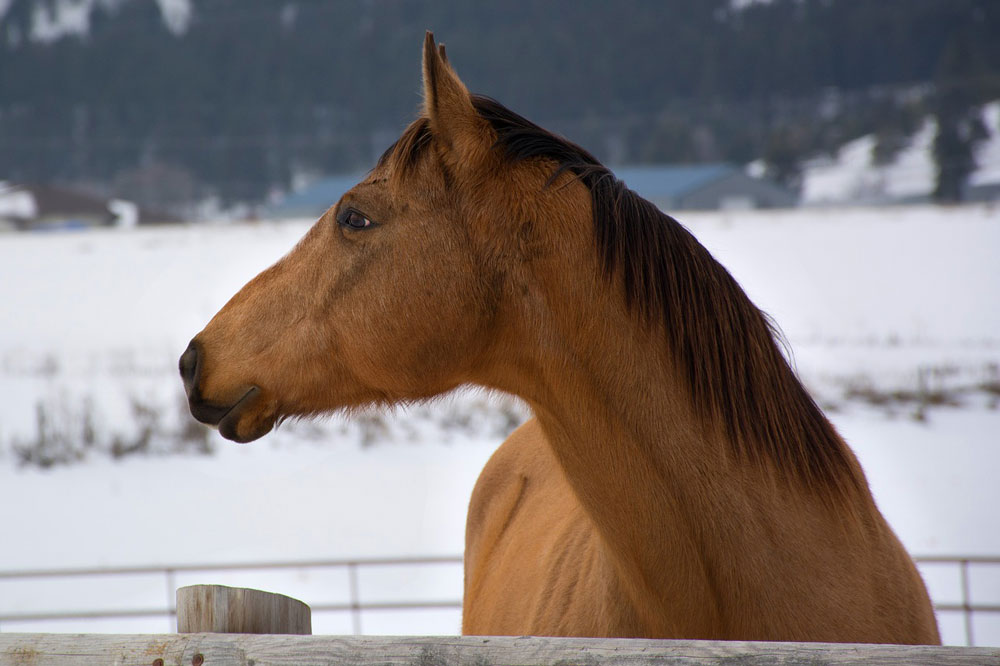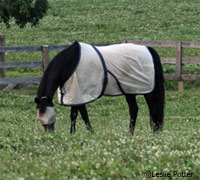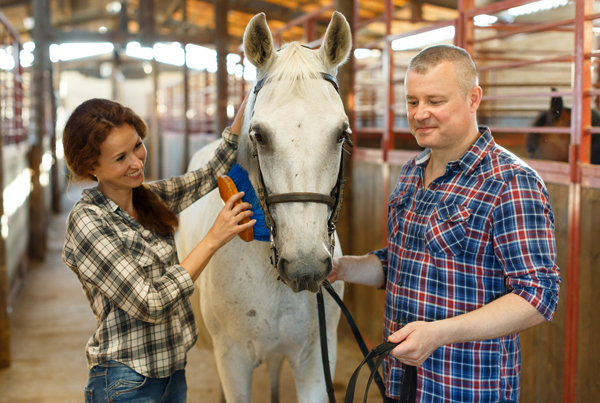Feeling crabby from the cold weather? Don’t worry—your horse probably isn’t. While us lowly humans may be piling on the layers and dreaming of the beach (or at least better riding weather), our horses naturally have this seasonal shift under control. So if you’re worried about what winter might bring for your horse, don’t be—he’s more than likely got it covered. Read on to learn more about winter wellness for horses and winter horse care.

Winter Horse Care: Cold Comfort on the Farm
First tip on winter wellness in horses, is that horses can find comfort in the cold. Just because the mercury begins to drop doesn’t mean it’s time to bring the herd inside until spring. Having a large body mass that generates heat naturally through their extensive digestive process, adult horses are typically happier in ambient temperatures lower than what humans consider comfortable. A healthy, adult horse that is acclimated to cold weather can be comfortable in temperatures hovering near 20 degrees F.
What is uncomfortable for a horse is a cold environment where wind and moisture enter the picture. Wind chills can cut through the thickest of winter coats (and most blankets), and dampness from snow and sleet can nullify a body’s attempts at generating heat. Therefore, while horses are naturally adept at winterizing, they still require protection from wind and wet. In moderate climates, this may be as simple as standing near a few large trees for a wind break, but where weather is worse, a run-in shed will provide ample shelter from the elements.
Braving the Winter Weather
Second tip on winter wellness for horses is that the cold weather may be healthier for your horse than you think. No matter how cozy a freshly bedded stall may appear, fresh outdoor air is typically better for your horse’s overall health than a barn’s atmosphere. Even the cleanest of closed barns in the winter will have ammonia fumes from urine, not to mention dust from bedding and hay. Neither of these indoor contaminants are good for your horse’s respiratory system, and for those with allergic sensitivities or recurrent airway obstruction (heaves, or RAO), these pollutants may trigger unwanted inflammation in your horse’s airways. This results in a dry cough and an increased risk of respiratory infection.
To help keep your horse’s airways healthy during the winter, get your horse into the fresh air and out of the barn as much as possible. When in the barn, resist the temptation to close the doors and windows for extended periods of time. Ventilation is key for stalled individuals. Being out of the damp and out of the wind means a healthy adult horse can be comfortable in a barn much cooler than his human counterparts may appreciate.
When evaluating your horse’s pasture for winter-readiness, keep in mind the location of food and water access in relation to shelter. Ideally, these should all be close together, as horses in bad weather are more likely to pick comfort over water. Resultant dehydration in the winter is an impaction colic waiting to happen.
Additionally, don’t forget the ever-present pecking order in a herd of horses. Those lower on the social ladder may get pushed out of a small run-in or sheltered area. Check to make sure there’s there enough room for everyone to be comfortable, including the boss mares and senior horses.

Winter Wellness for Horses: Dining in December
One major reason horses adapt well to cold weather is due to their metabolism; their large and complex digestive tracts act almost like a furnace. However, akin to a higher energy bill, this internal heater comes at a cost in the form of an increase in caloric demand in the winter.
A horse’s caloric needs increase the colder it gets. Ambient temperatures below 20 degrees F is typically the tipping point for this extra calorie demand to kick in. A good rule of thumb is to remember that when temperatures reach 0 degrees, an average adult horse should receive an additional 4 pounds of food daily. But this doesn’t mean an extra 4 pounds of grain.
While it’s tempting and seemingly intuitive to reach for a “hot” concentrate feed to stoke those digestive fires, the most efficient and healthy way to increase caloric intake for your horse in the winter is by adding free-choice roughage, such as good-quality hay. The fermentation process by which your horse digests fiber generates much more internal heat than the relatively simple digestion of grains. Feeding free-choice roughage also gives your horse the choice to regulate his intake throughout the day, which is better for a healthy equine digestive system than scheduled meals.
Special Considerations for Winter
Special considerations will be taken into account for winter horse care during the cold months for special horses. Yes, horses fare well in winter overall, but there are always exceptions. Those that need some extra TLC in the colder months include growing horses, those with chronic illness, and our senior equines.
All three of these types of horses may have a metabolism that isn’t quite at full capacity, therefore reducing their ability to generate heat, or they simply aren’t able to consume enough fuel on a daily basis. Sometimes, it’s a bit of both. But take heart. With some extra care, these horses can weather winter with the best of them.
The most obvious sign that a horse is struggling in the winter is weight loss. Evaluating body condition scores or using a weight tape on a monthly basis throughout the winter is the best way to objectively monitor your horse’s weight. This avoids a nasty revelation in the spring when the blanket comes off or winter coat sheds out and you’re faced with a skinnier horse than you started with at the end of fall.
Regular body weight monitoring also allows you to make incremental changes in routine or diet over the winter months instead of drastic changes all at once. Slow and steady is usually preferable when it comes to your horse’s health.
If you notice your horse losing weight during the winter despite increasing his forage and blanketing, a visit from your veterinarian may be warranted. Senior dental issues are a very common culprit of winter weight loss, and an older horse may need a dental float to file any sharp or uneven molars. Metabolic diseases, such as Cushing’s, can also exacerbate weight loss. Your veterinarian may want to run some blood work to rule out other underlying health causes.
Understanding how your horse naturally beats the cold weather can help you enjoy the winter worry-free. With a few care tips to keep in mind, this winter may just fly by, and it will be spring before you know it.
This article originally appeared in the December 2018 issue of Horse Illustrated magazine. Click here to subscribe!





